- Home
- Ken Follett
A Place Called Freedom Page 2
A Place Called Freedom Read online
Page 2
She decided to banter with him a little. "It really is most inconsiderate of you to live in London," she said.
"Inconsiderate?" He frowned. "Why?"
"You leave us without neighbors." Still he looked puzzled. It seemed he did not have much of a sense of humor. She explained: "With you away there isn't another soul between here and Edinburgh."
A voice behind her said: "Apart from a hundred families of coal miners and several villages of crofters."
"You know what I mean," she said, turning. The man who had spoken was a stranger to her. With her usual directness she said: "Anyway, who are you?"
"Jay Jamisson," he said with a bow. "Robert's cleverer brother. How could you forget?"
"Oh!" She had heard he had arrived late last night, but she had not recognized him. Five years ago he had been several inches shorter, with pimples on his forehead and a few soft blond hairs on his chin. He was handsomer now. But he had not been clever then and she doubted if he had changed in that respect. "I remember you," she said. "I recognize the conceit."
He grinned. "If only I'd had your example of humility and self-effacement to copy, Miss Hallim."
Robert said: "Hullo, Jay. Welcome to Castle Jamisson."
Jay looked suddenly sulky. "Drop the proprietorial air, Robert. You may be the elder son but you haven't inherited the place yet."
Lizzie intervened, saying: "Congratulations on your twenty-first birthday."
"Thank you."
"Is it today?"
"Yes."
Robert said impatiently: "Are you going to ride to church with us?"
Lizzie saw hatred in Jay's eyes, but his voice was neutral. "Yes. I've told them to saddle a horse for me."
"We'd better get going." Robert turned toward the stable and raised his voice. "Hurry up in there!"
"All set, sir," a groom called from within, and a moment later three horses were led out: a sturdy black pony, a light bay mare, and a gray gelding.
Jay said: "I suppose these beasts have been hired from some Edinburgh horse-dealer." His tone was critical, but he went to the gelding and patted its neck, letting it nuzzle his blue riding-coat. Lizzie saw that he was comfortable with horses and fond of them.
She mounted the black pony, riding sidesaddle, and trotted out of the yard. The brothers followed, Jay on the gelding and Robert on the mare. The wind blew sleet into Lizzie's eyes. Snow underfoot made the road treacherous, for it hid potholes a foot or more deep that caused the horses to stumble. Lizzie said: "Let's ride through the woods. It will be sheltered, and the ground is not so uneven." Without waiting for agreement she turned her horse off the road and into the ancient forest.
Underneath the tall pines the forest floor was clear of bushes. Streamlets and marshy patches were frozen hard, and the ground was dusted white. Lizzie urged her pony into a canter. After a moment the gray horse passed her. She glanced up and saw a challenging grin on Jay's face: he wanted to race. She gave a whoop and kicked the pony, who sprang forward eagerly.
They dashed through the trees, ducking under low boughs, jumping over fallen trunks, and splashing heedlessly through streams. Jay's horse was bigger and would have been faster in a gallop, but the pony's short legs and light frame were better adapted to this terrain, and gradually Lizzie pulled ahead. When she could no longer hear Jay's horse she slowed down and came to a standstill in a clearing.
Jay soon caught up, but there was no sign of Robert. Lizzie guessed he was too sensible to risk his neck in a pointless race. She and Jay walked on, side by side, catching their breath. Heat rose from the horses, keeping the riders warm. "I'd like to race you on the straight," Jay panted.
"Riding astride I'd beat you," she said.
He looked a little shocked. All well-bred women rode sidesaddle. For a woman to ride astride was considered vulgar. Lizzie thought that was a silly idea, and when she was alone she rode like a man.
She studied Jay out of the corner of her eye. His mother, Alicia, Sir George's second wife, was a fair-haired coquette, and Jay had her blue eyes and winning smile. "What do you do in London?" Lizzie asked him.
"I'm in the Third Regiment of Foot Guards." A note of pride came into his voice and he added: "I've just been made a captain."
"Well, Captain Jamisson, what do you brave soldiers have to do?" she said mockingly. "Is there a war in London at the moment? Any enemies for you to kill?"
"There's plenty to do keeping the mob under control."
Lizzie suddenly remembered Jay as a mean, bullying child, and she wondered if he enjoyed his work. "And how do you control them?" she asked.
"For example, by escorting criminals to the gallows, and making sure they don't get rescued by their cronies before the hangman does his work."
"So you spend your time killing Englishmen, like a true Scots hero."
He did not seem to mind being teased. "One day I'd like to resign my commission and go abroad," he said.
"Oh--why?"
"No one takes any notice of a younger son in this country. Even servants stop and think about it when you give them an order."
"And you believe it will be different elsewhere?"
"Everything is different in the colonies. I've read books about it. People are more free and easy. You're taken for what you are."
"What would you do?"
"My family has a sugar plantation in Barbados. I'm hoping my father will give it to me for my twenty-first birthday, as my portion, so to speak."
Lizzie felt deeply envious. "Lucky you," she said. "There's nothing I'd like more than to go to a new country. How thrilling it would be."
"It's a rough life out there," he said. "You might miss the comforts of home--shops and operas and French fashions, and so on."
"I don't care for any of that," she said contemptuously. "I hate these clothes." She was wearing a hooped skirt and a tight-waisted corset. "I'd like to dress like a man, in breeches and shirt and riding boots."
He laughed. "That might be going a bit far, even in Barbados."
Lizzie was thinking: Now, if Robert would take me to Barbados, I'd marry him like a shot.
"And you have slaves to do all the work," Jay added.
They emerged from the forest a few yards upstream from the bridge. On the other side of the water, the miners were filing into the little church.
Lizzie was still thinking about Barbados. "It must be very odd, to own slaves, and be able to do anything you like to them, as if they were beasts," she said. "Doesn't it make you feel strange?"
"Not in the least," Jay said with a smile.
3
THE LITTLE CHURCH WAS FULL. THE JAMISSON FAMILY and their guests took up a great deal of room, the women with their wide skirts and the men with their swords and three-cornered hats. The miners and crofters who formed the usual Sunday congregation left a space around the newcomers, as if afraid they might touch the fine clothes and besmirch them with coal dust and cow dung.
Mack had spoken defiantly to Esther, but he was full of apprehension. Coal owners had the right to flog miners, and on top of that Sir George Jamisson was a magistrate, which meant he could order someone hanged, and there would be no one to contradict him. It was indeed foolhardy for Mack to risk the wrath of such a powerful man.
But right was right. Mack and the other miners were being treated unjustly, illegally, and every time he thought of it he felt so angry he wanted to shout it from the rooftops. He could not spread the news surreptitiously, as if it might not really be true. He had to be bold, or back out.
For a moment he considered backing out. Why make trouble? Then the hymn began, and the miners sang in harmony, filling the church with their thrilling voices. Behind him Mack heard the soaring tenor of Jimmy Lee, the finest singer in the village. The singing made him think of High Glen and the dream of freedom, and he steeled his nerve and resolved to go through with his plan.
The pastor, Reverend John York, was a mild-mannered forty-year-old with thinning hair. He spoke hesitantly, unnerv
ed by the magnificence of the visitors. His sermon was about truth. How would he react to Mack's reading out the letter? His instinct would be to take the side of the mine owner. He was probably going to dine at the castle after the service. But he was a clergyman: he would be obliged to speak out for justice, regardless of what Sir George might say, wouldn't he?
The plain stone walls of the church were bare. There was no fire, of course, and Mack's breath clouded in the cold air. He studied the castle folk. He recognized most of the Jamisson family. When Mack was a boy they had spent much of their time here. Sir George was unmistakable, with his red face and fat belly. His wife was beside him, in a frilly pink dress that might have looked pretty on a younger woman. There was Robert, the elder son, hard eyed and humorless, twenty-six years old and just beginning to develop the round-bellied look of his father. Next to him was a handsome fair-haired man of about Mack's age: he had to be Jay, the younger son. The summer Mack was six years old he had played with Jay every day in the woods around Castle Jamisson, and both had thought they would be friends for life. But that winter Mack had started work in the pit, and then there was no more time for play.
He recognized some of the Jamissons' guests. Lady Hallim and her daughter, Lizzie, were familiar. Lizzie Hallim had long been a source of sensation and scandal in the glen. People said she roamed around in men's clothing, with a gun over her shoulder. She would give her boots to a barefoot child then berate its mother for not scrubbing her doorstep. Mack had not set eyes on her for years. The Hallim estate had its own church, so they did not come here every Sunday, but they visited when the Jamissons were in residence, and Mack recalled seeing Lizzie on the last occasion, when she had been about fifteen; dressed as a fine lady, but throwing stones at squirrels just like a boy.
Mack's mother had once been a ladies' maid at High Glen House, the Hallim mansion, and after she married she had sometimes gone back, on a Sunday afternoon, to see her old friends and show off her twin babies. Mack and Esther had played with Lizzie on those visits--probably without the knowledge of Lady Hallim. Lizzie had been a little minx: bossy, selfish and spoiled. Mack had kissed her once, and she had pulled his hair and made him cry. She looked as though she had not changed much. She had a small impish face, curly dark hair and very dark eyes that suggested mischief. Her mouth was like a pink bow. Staring at her, Mack thought I'd like to kiss her now. Just as the notion crossed his mind she caught his eye. He looked away, embarrassed, as if she might have read his mind.
The sermon came to an end. In addition to the usual Presbyterian service there was to be a christening today: Mack's cousin Jen had given birth to her fourth child. Her eldest, Wullie, was already working down the pit. Mack had decided that the most appropriate time for his announcement was during the christening. As the moment drew near he felt a watery sensation in his stomach. Then he told himself not to be foolish: he risked his life every day down a mine--why should he be nervous about defying a fat merchant?
Jen stood at the font, looking weary. She was only thirty but she had borne four children and worked down the pit for twenty-three years and she was worn out. Mr. York sprinkled water on her baby's head. Then her husband, Saul, repeated the form of words that made a slave of every Scottish miner's son. "I pledge this child to work in Sir George Jamisson's mines, boy and man, for as long as he is able, or until he die."
This was the moment Mack had decided on.
He stood up.
At this point in the ceremony the viewer, Harry Ratchett, would normally step up to the font and hand over to Saul the "arles," the traditional payment for pledging the child, a purse of ten pounds. However, to Mack's surprise, Sir George rose to perform this ritual personally.
As he stood up, he caught Mack's eye.
For a moment the two men stood staring at one another.
Then Sir George began to walk to the font.
Mack stepped into the central aisle of the little church and said loudly: "The payment of arles is meaningless."
Sir George froze in midstep and all heads turned to look at Mack. There was a moment of shocked silence. Mack could hear his own heartbeat.
"This ceremony has no force," Mack declared. "The boy may not be pledged to the mine. A child cannot be enslaved."
Sir George said: "Sit down, you young fool, and shut your mouth."
The patronizing dismissal angered Mack so much that all his doubts vanished. "You sit down," he said recklessly, and the congregation gasped at his insolence. He pointed a finger at Mr. York. "You spoke about truth in your sermon, Pastor--will you stand up for truth now?"
The clergyman looked at Mack with a worried air. "What is this all about, McAsh?"
"Slavery!"
"Now, you know the law of Scotland," York said in a reasonable tone. "Coal miners are the property of the mine owner. As soon as a man has worked a year and a day, he loses his freedom."
"Aye," Mack said. "It's wicked, but it's the law. I'm saying the law does not enslave children, and I can prove it."
Saul spoke up. "We need the money, Mack!" he protested.
"Take the money," Mack said. "Your boy will work for Sir George until he's twenty-one, and that's worth ten pounds. But--" He raised his voice. "But when he's of age, he will be free!"
"I advise you to hold your tongue," Sir George said threateningly. "This is dangerous talk."
"It's true, though," Mack said stubbornly.
Sir George flushed purple: he was not used to being defied so persistently. "I will deal with you when the service is over," he said angrily. He handed the purse to Saul then turned to the pastor. "Carry on, please, Mr. York."
Mack was flummoxed. Surely they would not simply go on as if nothing had happened?
The pastor said: "Let us sing the final hymn."
Sir George returned to his seat. Mack remained standing, unable to believe it was all over.
The pastor said: "The Second Psalm: 'Why do the heathen rage, and the people imagine a vain thing?' "
A voice behind Mack said: "No, no--not yet."
He looked around. It was Jimmy Lee, the young miner with the wonderful singing voice. He had run away once already, and as a punishment he wore around his neck an iron collar stamped with the words This man is the property of Sir George Jamisson of Fife. Thank God for Jimmy, Mack thought.
"You can't stop now," Jimmy said. "I'm twenty-one next week. If I'm going to be free, I want to know about it."
Ma Lee, Jimmy's mother, said: "So do we all." She was a tough old woman with no teeth, much respected in the village, and her opinion was influential. Several other men and women voiced agreement.
"You're not going to be free," Sir George rasped, standing up again.
Esther tugged at Mack's sleeve. "The letter!" she hissed urgently. "Show them the letter!"
Mack had forgotten it in his excitement. "The law says differently, Sir George," he cried, waving the letter.
York said: "What is that paper, McAsh?"
"It's a letter from a London lawyer that I've consulted."
Sir George was so outraged he looked as if he might burst. Mack was glad they were separated by rows of pews; otherwise the laird might have got him by the throat. "You have consulted a lawyer?" he spluttered. That seemed to offend him more than anything else.
York said: "What does the letter say?"
"I'll read it," Mack said. " 'The ceremony of arles has no foundation in English or Scottish law.' " There was a rumble of surprised comment from the congregation: this contradicted everything they had been taught to believe. " 'The parents cannot sell what they do not own, namely the freedom of a grown man. They may compel their child to work in the mine until he reaches the age of twenty-one, but' "--Mack paused dramatically and read the next bit very slowly--" 'but then he will be free to leave!' "
All at once everyone wanted to say something. There was an uproar as a hundred people tried to speak, shout, begin a question or voice an exclamation. Probably half the men in the church had bee
n pledged as children and had always considered themselves slaves in consequence. Now they were being told they had been deceived, and they wanted to know the truth.
Mack held up a hand for quiet, and almost immediately they fell silent. For an instant he marveled at his power. "Let me read one more line," he said. " 'Once the man is adult, the law applies to him as it applies to everyone else in Scotland: when he has worked a year and a day as an adult he loses his freedom.' "
There were grunts of anger and disappointment. This was no revolution, the men realized; most of them were no more free than they had ever been. But their sons might escape.
York said: "Let me see that letter, McAsh."
Mack went up to the front and handed it to him.
Sir George, still flushed with anger, said: "Who is this so-called lawyer?"
Mack said: "His name is Caspar Gordonson."
York said: "Oh, yes, I've heard of him."
"So have I," said Sir George scornfully. "An out-and-out radical! He's an associate of John Wilkes." Everyone knew the name of Wilkes: he was the celebrated liberal leader, living in exile in Paris but constantly threatening to return and undermine the government. Sir George went on: "Gordonson will hang for this, if I have anything to do with it. That letter is treason."
The pastor was shocked at this talk of hanging. "I hardly think treason comes into it--"
"You'd better confine yourself to the kingdom of heaven," Sir George said sharply. "Leave it to men of this world to decide what is treason and what is not." With that he snatched the letter out of York's hand.
The congregation were shocked at this brutal rebuke to their pastor, and they went quiet, waiting to see how he would react. York held Jamisson's gaze, and Mack was sure the pastor would defy the laird; but then York dropped his eyes, and Jamisson looked triumphant. He sat down again, as if it were all over.

 The Pillars of the Earth
The Pillars of the Earth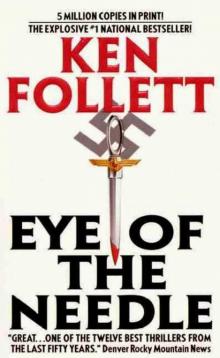 Eye Of The Needle
Eye Of The Needle Lie Down With Lions
Lie Down With Lions Winter of the World
Winter of the World Triple
Triple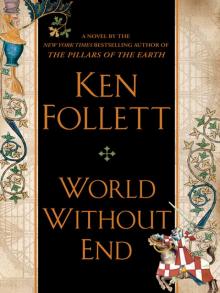 World Without End
World Without End Fall of Giants
Fall of Giants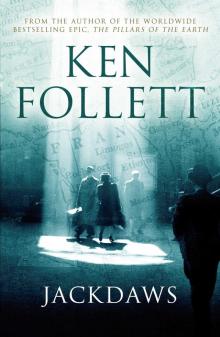 Jackdaws
Jackdaws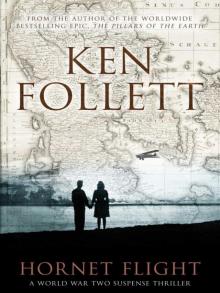 Hornet Flight
Hornet Flight Whiteout
Whiteout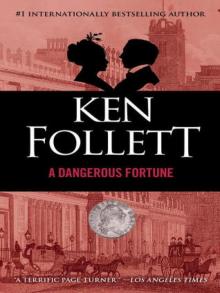 A Dangerous Fortune
A Dangerous Fortune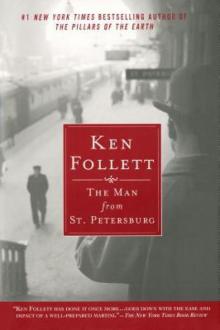 The Man From St. Petersburg
The Man From St. Petersburg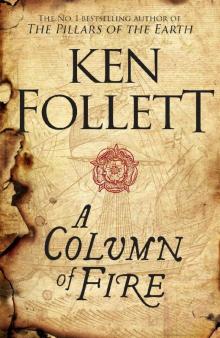 A Column of Fire
A Column of Fire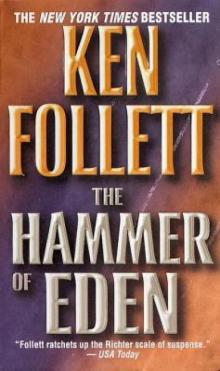 The Hammer of Eden
The Hammer of Eden On Wings of Eagles
On Wings of Eagles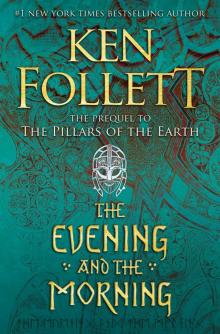 The Evening and the Morning
The Evening and the Morning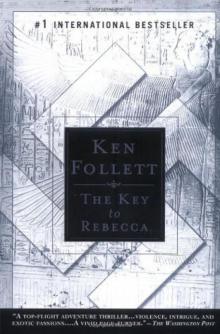 The Key to Rebecca
The Key to Rebecca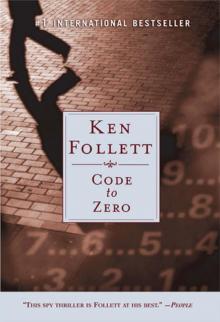 Code to Zero
Code to Zero Paper Money
Paper Money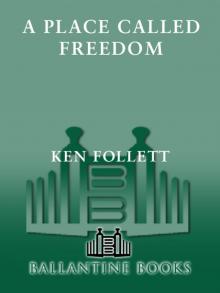 A Place Called Freedom
A Place Called Freedom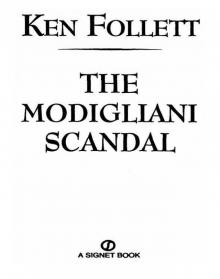 The Modigliani Scandal
The Modigliani Scandal Triple (1991)
Triple (1991)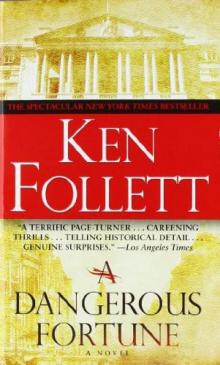 A Dangerous Fortune (1994)
A Dangerous Fortune (1994)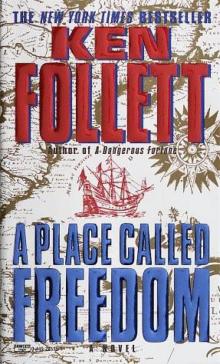 A Place Called Freedom (1995)
A Place Called Freedom (1995)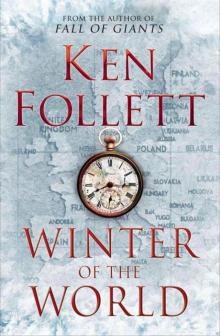 Winter of the World (Century Trilogy 2)
Winter of the World (Century Trilogy 2) Code to Zero (2000)
Code to Zero (2000) On Wings Of Eagles (1990)
On Wings Of Eagles (1990) Storm Island
Storm Island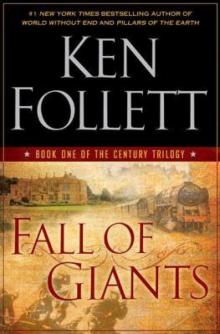 Fall of Giants (The Century Trilogy)
Fall of Giants (The Century Trilogy)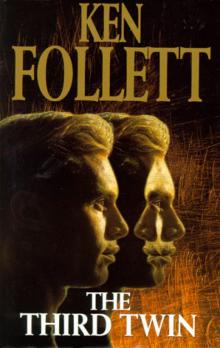 the Third Twin (1996)
the Third Twin (1996)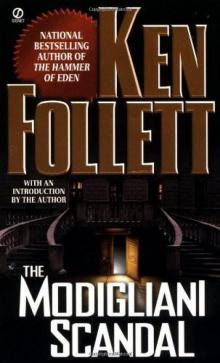 The Modigliani Scandal (1976)
The Modigliani Scandal (1976) Night Over Water
Night Over Water